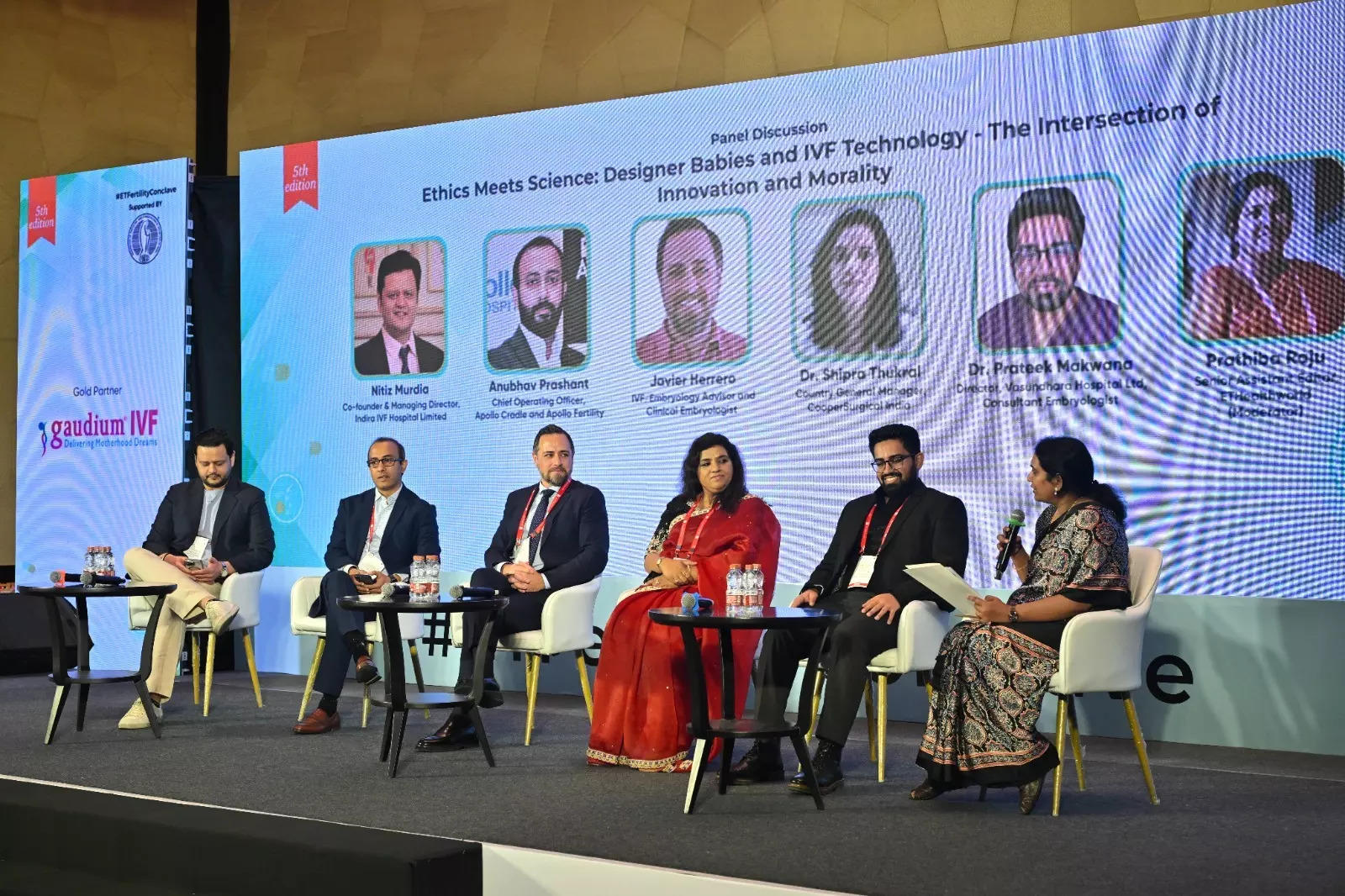
New Delhi: Image a future the place dad and mom can handpick their child’s traits, embryos develop safely in synthetic wombs, and AI predicts the most viable embryo for a profitable being pregnant. This isn’t science fiction—it’s the unfolding actuality of contemporary fertility science. Breakthroughs equivalent to CRISPR gene modifying, synthetic wombs, and AI-pushed embryo choice are remodeling reproductive medication.
Whereas these improvements provide hope for increased IVF success charges and the prevention of genetic issues, in addition they elevate deep moral considerations. Are we inching nearer to a world of “designer infants”? Might synthetic wombs problem conventional ideas of motherhood?
As science continues to push boundaries, society faces tough questions on the place to attract the line. This thought-upsetting theme took heart stage at the fifth version of the ETHealthworld Fertility Conclave throughout the panel dialogue titled “Ethics Meets Science: Designer Infants and IVF Know-how – The Intersection of Innovation and Morality.”
Experts together with Nitiz Murdia, Co-founder & Managing Director, Indira IVF Hospital Restricted; Anubhav Prashant, Chief Working Officer, Apollo Cradle and Apollo Fertility; Javier Herrero, IVF/Embryology Advisor and Scientific Embryologist; Dr. Shipra Thukral, Nation Normal Supervisor, CooperSurgical India; and Dr. Prateek Makwana, Director, Vasundhara Hospital Ltd., Marketing consultant Embryologist, explored the moral dilemmas surrounding improvements equivalent to CRISPR gene modifying, synthetic wombs, and AI-pushed embryo choice.
The panel, moderated by Prathiba Raju, Senior Assistant Editor, ETHealthworld, examined the delicate steadiness between scientific development and ethical duty, elevating crucial questions on the way forward for fertility therapies and genetic interventions.
The panorama of fertility therapies is quickly evolving with developments equivalent to CRISPR gene modifying, synthetic wombs, and AI-pushed embryo choice. Whereas these improvements provide immense promise for enhancing success charges and addressing medical circumstances, in addition they elevate profound moral and social considerations.
In accordance with Anubhav Prashant, Chief Working Officer (COO), Apollo Cradle and Apollo Fertility, India’s IVF and fertility sector stays considerably underpenetrated. Increasing entry requires integrating revolutionary applied sciences and scientific developments.
Whereas gene-modifying methods like CRISPR are exhibiting promise globally, Prashant emphasised that these approaches nonetheless require intensive information validation earlier than they are often extensively commercialized.
From an moral standpoint, India’s journey from pre-ART to publish-ART phases highlights the want for stronger laws, significantly concerning ART banks and surrogate compensation frameworks—areas the place Western nations have extra structured insurance policies. Prashant believes that collaboration between the authorities, trade, and insurers is important for guaranteeing accountable adoption.
Rising Applied sciences and Moral Boundaries
Applied sciences equivalent to synthetic wombs maintain transformative potential but additionally carry dangers of misuse. Nitiz Murdia, Co-founder & Managing Director, Indira IVF Hospital Restricted, warned that such improvements could possibly be exploited for non-medical or aesthetic functions with out strict laws. Making certain these instruments are reserved for legit medical wants is essential to keep away from moral dilemmas.
Echoing related considerations, Javier Herrero, IVF/Embryology Advisor and Scientific Embryologist, careworn that synthetic wombs ought to primarily be used to assist untimely infants somewhat than allow elective interventions. With out clear moral safeguards, unregulated use may invite important societal and ethical challenges.
Emphasising on accountable innovation, Dr. Shipra Thukral, Nation Normal Supervisor, CooperSurgical India, underscored the significance of scientific trials and strong information validation to make sure affected person security and efficacy.
She additionally highlighted the want for complete affected person counseling to make sure people absolutely perceive the dangers, advantages, and practical outcomes earlier than pursuing superior fertility therapies. Balancing innovation with knowledgeable determination-making is crucial to making sure accountable adoption.
Germline Gene Modifying: The Indian Perspective
India at the moment lacks particular laws on germline modifying however follows ICMR pointers, which prohibit its scientific use.
In accordance with Nitiz Murdia, gene modifying holds potential for stopping circumstances like hemophilia and sickle cell anemia. Nevertheless, altering DNA raises important moral considerations, as future generations can not present consent. Following the controversial gene-modifying instances in China in 2019, India’s cautious method aligns with international suggestions, proscribing germline modifying to analysis underneath strict oversight by ethics committees.
Javier Herrero additional highlighted the challenges related to CRISPR expertise in embryos, citing low effectivity, mutation dangers, and affordability considerations. Till these dangers are addressed, he emphasised the significance of pursuing various, nicely-established options equivalent to PGT-M (Preimplantation Genetic Testing for Monogenic Problems) and gamete donation for addressing genetic considerations.
The panel additionally mentioned the rising position of AI-pushed applied sciences in shaping the way forward for fertility therapies.
“AI is poised to play a transformative position in IVF by enhancing embryo choice and lab automation. Whereas AI enhances effectivity, its success closely relies upon on strong information validation and clinician intervention,” stated Dr. Shipra Thukral.
She added that whereas AI-pushed instruments can suggest viable embryos, ultimate selections should contain skilled embryologists to make sure accuracy and security. Making certain information privateness, affected person confidentiality, and clear regulatory frameworks is important for AI’s accountable adoption in India’s fertility panorama.
The panel emphasised the must strike a steadiness between scientific progress and moral duty.
The boundary between therapeutic genetic intervention and non-important genetic enhancements stays a big concern. Dr. Prateek Makwana warned that gene modifying for non-medical functions dangers creating societal disparities, limiting genetic variety, and introducing vulnerabilities to infections.
Drawing from an iconic quote in Jurassic Park, he aptly said, “Scientists are sometimes so preoccupied with what they’ll do, they neglect to ask if they need to.”
As developments in reproductive science speed up, establishing a powerful moral framework that balances innovation with societal nicely-being is important to safeguarding the way forward for fertility therapies.
Source link
#Upholding #Ethics #FastTracking #Science #Experts #Weigh #Balancing #Innovation #IVF #Revolution #HealthWorld




